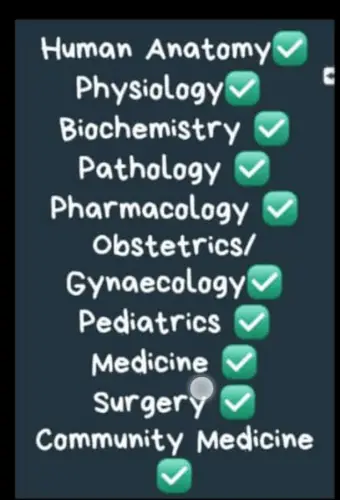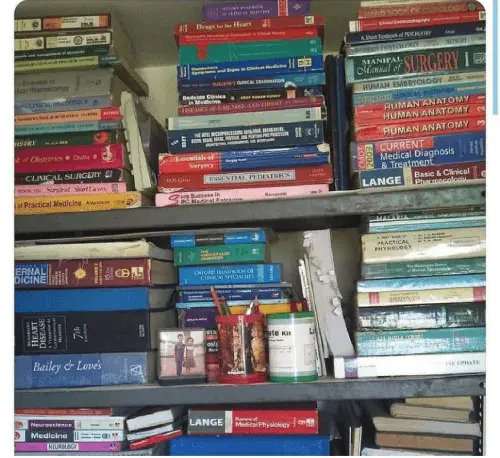I get this question a lot from my non-medical friends in the university; What are Medical School exams like?
It is obvious why non-medical students ask this question. It is because of how hard medical students study. In an average medical school in Nigeria, average medical students usually spend long hours studying than the average university student.
So other students often wonder why it is this way.
And the simple answer is that it is because of the nature of medical school exams in Nigeria.
After reading this post, you will understand why medical students study the way they do after looking at the nature of medical school exams.
Also, you will see the answers to some questions which are often asked about medical school like;
- How hard are medical school exams?
- How many exams are in medical school?
- How many hours should a medical student study?
- Do medical students enjoy their life?
- What happens when you fail medical school exams?
Table of Contents
- The Nature of Medical School Exams in Nigeria
- 8 Important Steps for Preparation of any of the Exams in Medical School
- 1. The Hunting and Gathering of all Necessary Study Materials
- 2. Get all the Course Outlines Ready
- 3. Write an Effective Time Table
- 4. Attend All Lectures and Make Notes
- 5. Attend all Practicals, Clinics, and Theaters
- 6. Clerk Patients in the Clinics as Often as Possible
- 7. Get a Textbook for easy References
- 8. Take a Break Once in a While
- Frequently Asked Questions About Exams in Medical Schools
- Final thoughts!
First, let us look at the Nature of Medical School exams in Nigeria.
The Nature of Medical School Exams in Nigeria

Medical school exams in Nigeria have been divided into three (3) main parts;
- The Pre-medical School Exams
- The Pre-clinical Medical School Exams and
- The Clinical Medical School Exams
1. The Pre-medical School Exams
The Pre-medical school exams are taken during your first year of medical school in Nigeria if your mode of admission into medical school is through JAMB/UTME and Post-UTME.
But if you entered medical school through direct entry, transfer, or JUPEB, then you will not be taking the pre-clinical medical school exams.
This is because, in the first year of medical schools in Nigeria, the courses are the same for almost all the students of medical and health sciences.
The Pre-medical school exam in Nigeria is also called the First-year Medical Exam in Nigeria.
Which Subjects Do You Take in the First Year Medical Exam in Nigeria?
The following subjects are offered in the first year of medical school in Nigeria;
First Semester
- The General Studies 1 (G.S); includes;
- The Use of English,
- Use of Library,
- Peace and Conflict Studies 1
- General Biology 1
- Genetics
- General Physics for Life Sciences
- Practical Physics
- Basic Principles of Chemistry 1
- Practical Chemistry
Second Semester
- General Studies 2. This includes;
- Use of English 2,
- Peace and Conflict Studies 2
- General Biology 2
- General Practical Biology
- Basic Parasitology
- General Physics 2
- General Physics 3
- Basic Principles of Chemistry 2
- Basic Principles of Chemistry 3
- Philosophy and Logic
- Humanities
The Nature of First Year Medical School Exams in Nigeria
Both the first and second semester of first-year medical exam consists of three (3) Parts
- The Essay;
- The Multiple Choice Questions
- The Practicals/Alternative to practicals
This is usually similar to other exams in every other first-year course in the university and the exam format is dependent on the choice of the department and their Head.
The Pre-clinical Medical School Exams in Nigeria
This is the next medical school exam one takes after successfully passing all the first-year medical exams.
One exam taken within this period is the infamous rate-limiting exam called the 2nd MBBS exam.
There is a special guide on this website about preparing for the 2nd MBBS exam in Nigeria which you can check later after reading through this post.
For most medical students, the 2nd MBBS exam is one of the most dreaded of the medical school exams because once it is failed twice in most medical schools in Nigeria, then one is withdrawn from medical school to study another course in the same university.
The Nature of 2nd MBBS Exam in Nigeria
The 2nd MBBS exam is also called the 1st professional exam in Medical School.
The 2nd MBBS Program runs for about 18 months or more depending on the medical school, their accreditation, and the situation of things in the country like strikes.
It covers both the 2nd year and 3rd years of medical school.
The 2nd MBBS is a very hectic one and its preparation requires lots of readings so that one can cover all the required 2nd MBBS subjects and medical textbooks which include;
- Human Anatomy:
- Gross Anatomy,
- Embryology,
- Histology, and
- Osteology
- Human Physiology and
- Medical Biochemistry
The 2nd MBBS exam in Nigeria consists of a series of tests and the main exams.
The 2nd MBBS tests include;
- The First Test
- The Second Test
- The Third test
- The Mock
- The Practicals
All these tests are taken for each of the 2nd MBBS subjects; Anatomy, Physiology, and Biochemistry.
And for each of the tests for a specific subject, a multiple choice question of 100 questions is asked, and sometimes with essay questions.
In some medical schools, a system of marking called ‘negative marking’ is used in assessing the performance of students.
Negative marking means that some marks are subtracted from your total score for every question you fail after your total score has been calculated.
For the practicals, it is judged cumulatively. So your performance for every practical you perform with your group from your first day in 2nd MBBS class is recorded till the last day.
In the end, you are graded based on your overall performance.
The Main 2nd MBBS Exam in Nigeria
The main exam is taken within a period of 2-3 weeks depending on the medical school.
It consists of the following;
- The Multiple Choice Questions: usually made of 100 questions for each of the medical school subjects covering all the topics taught within the 18 months period.
- The Essay Questions: Contains questions from what the medical students have learned throughout the 18 months period.
- The Steeple Chase and Practical Exams: The nature of the steeple chase exams is like that of an alternative to practical. Things which the medical students learned during their practicals in school are displayed on tables in sections with questions attached to each section. For instance, the anatomy steeple chase will be made up of soft tissues from histology displayed either with a microscope or projected on a slide. It also contains anatomic models, organs, and soft tissues which they must have learned during the dissection classes.
- The VIVA and oral exams: The VIVA and oral exams involves meeting an external or internal examiner who assesses the student buy asking either direct or applied questions. This is to assess if they are fit enough to move over to the next class.
Also, Read; How to study anatomy in medical school
2. The Clinical Medical School Exam in Nigeria
They are called the clinical exams because that is when medical students in Nigeria begin to see real patients in the clinics, wards, and the surgical theatre.
There are three medical school exams taken within this period and they include;
- The 3rd MBBS exam or the 2nd Professional Exam
- The 4th MBBS Exam or the 3rd Professional Exam
- The 5th MBBS Exam or the 4th/Final Professional Exam
The Nature of 3rd MBBS Exam in Nigeria
The 3rd MBBS exam is the 2nd professional Medical School exam in Nigeria. It is also arguably the least discussed exam in Nigerian Medical School.
This is explained by 3 theories which are also discussed on this website.
Read; Why 3rd MBBS exam is the least discussed in Nigerian Medical School
There are two subjects written in the 3rd MBBS Exam, and they include;
Pathology:
Pathology is the study of disease processes in the human body and is made up of 3 branches;
- Morbid Anatomy/Histopathology
- Heamatology
- Chemical Pathology and
- Medical Microbiology
Each of these branches has its department, textbooks, and lecture notes which are different from each other.
Pharmacology:
Pharmacology is the study of drugs and their use in the treatment and management of diseases.
Just like the 2nd MBBS exam, the Second Professional Medical Exam is made up of a series of tests; first, second, third, mock, Practicals, and a main medical exam.
Each of the four departments in Pathology sets their own questions independently and each contributes 25% of your total score in the Final pathology result.
The main exam for 3rd MBBS consist of the following;
- The Multiple Choice Questions
- The Essay Questions
- The Steeple Chase and Alternative to practical
- The VIVA and Oral exams
The major difference between the nature of the 2nd MBBS exam and the 3rd MBBS exam is that a large part of the time spent in the 3rd MBBS class is usually in the clinics and wards attending to c.
Also, the questions in 3rd MBBS are mainly clinically oriented questions unlike that of 2nd MBBS which are often direct.
The Nature of 4th MBBS in Nigeria
The 4th MBBS exam is also called the 3rd Professional exam in Medical School.
The 4th MBBS exam is also of the most dreaded exams in medical school. And you will find out why after reading through the subjects taken in the 4th MBBS exam.
The Subjects offered in the 4th MBBS class include;
Paediatrics:
Pediatrics is the major reason why 4th MBBS is among the most dreaded exams in medical school. It is mainly because of how voluminous the subject is. It is almost like the whole of Medicine done within a period of 18 months with one other subject which is described below.
Obstetrics and Gyneacology:
This subject is popularly called O&G. And it is made up of two main branches; Obstetrics which deals with the study of the pregnant woman, her fetus, and her newborn child. The other one called Gynecology deals with the study of a non-pregnant woman.
The 4th MBBS follows the same trend just like other medical exams mentioned above; the series of tests, the Mock, the Main, Practicals (History Taking and Examination), and the VIVA.
But this time, the medical students are usually introduced to a new type of medical exam called the ‘OSPE’ or OSCE.
The OSPE/OSCE is an acronym for Objective Structured Practical Examination and Objective Structured Clinical Examination respectively. They are basically the same and could be used interchangeably.
The OSPE is a modified form of Steeplechase examination where patients, medical study materials, or medical equipment are used in assessing the medical students in a station format.
Also, in the Main 4th MBBS exam, the medical students are meant to take the History of patients and examine them. This is done under the observation of a Consultant who is assigned to each student. The student is examined by this consultant after the history taking and examination based on the findings.
The Nature of 5th MBBS Exam in Nigeria
The 5th MBBS exam is the final medical school exam that medical students take. Success in this exam marks the completion of one’s MBBS program in Nigeria.
The Following Medical School Subjects are taken in the 5th MBBS Exam;
Medicine:
This consists of all medical students who have been learning from their first clinical postings Medicine 1 to the last clinical posting Medicine 4. The clinical posting span from the 4th year in medical school till the final year in medical school.
The medical students during the clinical rotations pass through the following departments in Medicine;
- Cardiology
- Rheumatology
- Endocrinology
- Nephrology
- Neurology
- Infective Diseases
- Pulmonology
- Gastroenterology
- Metabolic Diseases and
- Palliative Medicine
Surgery:
Just like medicine, spans from your 4th year in medical school through the final year till the final medical exam in Nigeria.
The Surgical postings include Surgery 1, 2, 3, and 4. and the Departments in which the medical students are examined under surgery include;
- Orthopaedic Surgery and Traumatology
- General Surgery
- Urology
- Neurosurgery
- Plastic Surgery
Short Posting Departments:
These are a series of short clinical and surgical postings which make up a good part of the final medical school exam. The medical students are also meant to rotate through all these short posting departments for a period of 3 weeks each. The departments include;
- Psychiatry
- Anaesthesiology
- Accident and Emergency
- Radiology
- Ear, Nose and Throat / Otolaryngology
- Family Medicine
- Ophthamology
Public Health and Community Medicine:
This is another department in Medicine. And students are also examined in this subject area. Also, they are meant to complete a research project which is meant to be completed in partial fulfillment of the course.
The 5th MBBS exam is very similar to final MBBS exams in the format and mode of examination. It consists of;
- A series of tests which is taken at the end of each clinical posting,
- the mock,
- Practical or OSPE,
- the Main Exam and
- the VIVA or Oral Exams.
So you have seen the nature of the medical school exams in Nigeria. And you know why Medicine and Surgery are considered the most difficult course anyone can study in Nigeria.
We will be taking a look at the second part of this post;
Also, Read; Things to expect in 5th year of medical school
8 Important Steps for Preparation of any of the Exams in Medical School
According to an erudite Professor from the University of Nigeria, there are 5 Important Steps that you must take in preparation for the medical school exams.
The doctor emphasized that many medical students miss some or all of these important steps making it difficult to remain organized in the course of their study leading to increase levels of stress in medical students.
But before then, make sure you have the medical school essentials to make your study easy and hassle-free.
The steps are discussed below;
1. The Hunting and Gathering of all Necessary Study Materials

The first most important step in preparing for any of the exams in medical school is to source for and gather all the recommended study materials for the exam.
This should be done as early as the first few weeks of school resumption.
Examples of study materials could be;
- Textbooks
- Videos (Find and Follow Related Youtube Channels)
- Study notes
- Download the necessary study apps for medical students
You can find out the recommended medical school textbooks used in your own school by attending medical student doctor forums or by asking older colleagues.
The reason why this step is very important in the early phase of preparing for any of the medical school exams is that it allows you to remain organized throughout the preparation period.
Also, Read; All the Medical School Subjects and Recommended Textbooks
2. Get all the Course Outlines Ready
The course outlines for each of the subjects in medical school should be ready even before the first lecture in the subject.
So make sure you have a copy of this as it will guide you on what to study and what not to study for the exams.
3. Write an Effective Time Table
Having the course outline is just not enough. You also need to have a dedicated timetable to manage your time well.
Medical school subjects are usually very voluminous and you do not want to spend time reading one particular subject while the others are suffering.
Also, allow much time for each of the medical school subjects to allow you to have enough time to read and understand each topic well.
Dedicating one day to a subject, depending on the medical exam you are preparing may not be a bad idea.
4. Attend All Lectures and Make Notes
To pass your medical school exams, certain lectures are very crucial that you attend them. Some medical students may skip classes and still pass the exams.
But it is advisable that you attend all as it opens your eyes to what your lecturers expect from you in the medical school exams and increases your chances of passing.
Also, do not forget to make important notes in class. Those notes may be your savior when the exams are nearby.
Remember that most medical schools in Nigeria require that you make up to 75% attendance to lectures before you are eligible to write any of the medical school exams.

5. Attend all Practicals, Clinics, and Theaters
Just like the lectures, attending practicals helps in memory consolidation, because you learn from what you see, hear, and touch too not just what you read.
Seeing a lot of clinical cases being managed according to my source makes them easier to remember in the exams.
Also, remember that a certain percentage is attached to attendance to practicals, clinics, and theaters.
6. Clerk Patients in the Clinics as Often as Possible
Clerking in the art of history taking and physical examination of patients.
Many consultants have been teaching that the more patients a medical student clerk, the more they get used to it. And I don’t see any lie here as it is very obvious.
7. Get a Textbook for easy References
Even if you do not have money to buy medical textbooks, borrow from friends, read them and return them.
There are some topics that you just can’t understand by reading the lecture notes and materials.
Find these topics and watch videos on them, and also read them up in the recommended medical textbook.
8. Take a Break Once in a While
All work and no play make students dull. Once in a while, find out time to do what you love outside of medicine.
Reward yourself from time to time for the long hours you have spent studying so that you will have the motivation to keep studying more.
Also, Read; What is the best music for focus while reading?
Frequently Asked Questions About Exams in Medical Schools
Finally, let us look at some of the Frequently asked questions about medical school exams.
How hard are medical school exams?
Medical school exams are as hard as you have seen in their descriptions above.
They are so hard that if you are not well prepared for them and if you are not dedicated to your work, you may fail them.
It is also not so hard that it cannot be passed.
A lot of people have passed through medical schools in Nigeria, and today are doctors.
So it is actually something that can be done.
How many MBBS exams are in medical school?
There are four (4) professional medical exams in Medical school and they include;
- 2nd MBBS exam (The first Professional exam)
- 3rd MBBS exam (The Second Professional exam)
- 4th MBBS exam (The Third Professional Exam)
- 5th MBBS exam (The fourth and final professional exam)
Apart from the four professional exams, there are many other tests and exams written in medical school like the 1st year medical school exam, and the tests following each of the MBBS exams.
How many hours should a medical student study?
It depends. But on average, I would say an average of 2-3 hours of active study daily when the medical exams are not nearby.
But as the exams come closer, some medical students study close to about 8 to 12 hours or more daily.
The thing is to understand yourself and develop a study strategy to suit you.
What happens when you fail medical school exams?
When you fail one of the three subjects in the 2nd MBBS in Nigeria, you will resit for the exam on just the subject you failed.
But if you fail the subject again, then you have to repeat the whole 2nd MBBS program.
If you fail any of the subjects again, you still resit for the exam, but finally, if you fail the resit the second time, you will be withdrawn out of medical school.
On the other hand, if you fail two subjects in the 2nd MBBS exam, you will resit for the exam and if you fail two again, you will be withdrawn from medical school.
Also, if you fail all three subjects with a score below the minimum set by the school, then you are automatically withdrawn from medical school without a chance to resit.
But if you score above the minimum for the 3 subjects, then you can repeat the 2nd MBBS program the second time. And so on.
After the 2nd MBBS class, a medical student will continue to repeat a medical exam up till the 4th attempt after which he/she is withdrawn from medical school.
Do medical students enjoy their life?
Yes and No! Some medical students do live a very balanced life while some always complain about the stress in medical school.
Whichever one you are, the term enjoyment is subjective and there is no standard to judge what it means for all.
But it is good and advisable if you find something interesting in your day-to-day life in medical school and let it bring joy and happiness to you.
Also, Read; Mnemonics For Medical Students: Book Review
Final thoughts!
Medical students in Nigeria are subjected to a lot of stress in medical school that they need special gifts during graduation.
If you think studying medicine in Nigeria is easy, pick a Jamb form and attempt to get admission to study medicine.
After your first set of medical school exams, come back and give your feedback on this page.
You May Also Like:



Sir, sometimes I wished I never signed uo6 for MBBS.
I have written my first MB exam and guess what I didn’t make it.
There was so much stress and not enough time to read.
I messed up Sir..
Any advice for someone still willing to study the course?
Hi Thomson, I deeply feel your pain. I have met a lot of medical students who have been through similar scenarios before.
Currently, some are doctors and the others took alternate career paths and completed their degree in any of the medical-related courses and are still doing very well.
I feel one thing young medics and medical aspirants fail to understand is that the course one study is not a destination per se, rather it’s like a route to your destination in life. It’s just like an instrument to help you achieve your greater goal in life.
If you can come up with this simple answer of what your greater goal in life is, you will have no issues in choosing a course to study because regardless of your degree, you can still fulfill any purpose.
However, here is my final advice; if you have the guts, and if you feel like you cannot achieve anything in life if you don’t study medicine, you can go again and give it another shot, and when you succeed, your future self will be happy for you.